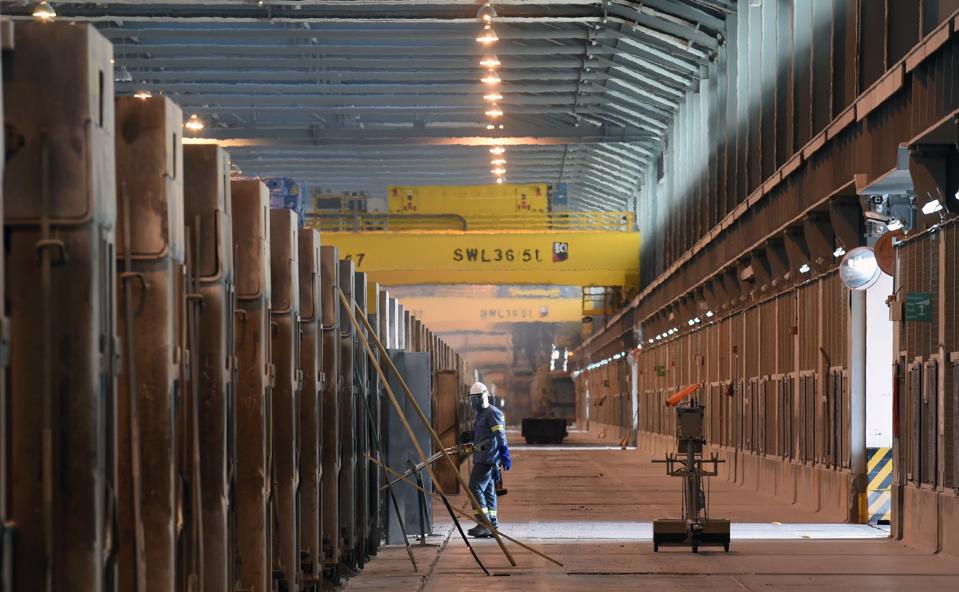By Saman Rizwan
In the ever-evolving landscape of global commodities, Saudi Arabia finds itself at the crossroads of an extraordinary opportunity. The Kingdom possesses the unique potential to revolutionize the world of traceability in commodities by leveraging its vast resources and forging innovative partnerships, thus positioning itself as the ‘Green Exchange’ of the future, serving the emerging Super Region of Africa, Western and Central Asia.
In this era of the energy transition, transparency and the assurance of mineral provenance have become paramount in the downstream sector. The demand for “green minerals,” sourced and processed responsibly, has surged. While commendable efforts in the realm of Environmental, Social, and Governance (ESG) standards and responsible sourcing have made significant strides, they remain predominantly standards-based approaches.
The challenge lies in the sheer multitude of standards and regulations governing various commodities and industries, making the quest for a single, unified standard for mineral provenance a formidable task. Nevertheless, harmonization efforts are underway, spearheaded by the International Council on Mining and Metals (ICMM). Collaborating with stakeholders such as the OECD, the Responsible Miners Initiative, and downstream companies, ICMM is diligently working towards establishing a single industry standard for responsible mining. This endeavor, while in its nascent stages, signifies a crucial step toward responsible sourcing and alignment on standardized practices in the mining industry. Yet, the arena of minerals traceability remains largely uncharted territory, offering an enticing opportunity for pioneering leadership.
Beyond the technological challenges, the minerals industry faces the formidable obstacle of society’s skepticism toward mining practices. Downstream companies and consumers are understandably cautious about traceability efforts driven solely by the mining sector, with one recent article succinctly observing, “never before has the world needed so much from an industry that is trusted so little.”
Previous forays into minerals traceability predominantly centered on bulk commodity pilots, with diamonds and gold being the notable exceptions that scaled sourcing efforts. Initiatives such as BHP’s blockchain-based iron ore trade through the MineHub platform and Tiffany’s Diamond Provenance & Source Initiative for individually registered diamonds have paved the way. Gold is also beginning to make strides in this regard. Although various upstream assurance mechanisms exist, most remain small-scale, and refiners still conduct their due diligence.
In this landscape, Chopard’s Fairmined Standard and IMPACT’s Just Gold Traceability and others have demonstrated the potential for stringent criteria concerning working conditions, social development, and environmental protection. However, the traceability landscape for critical minerals, especially bulk commodities, demands novel approaches.
These multifaceted challenges, combined with the dearth of traceability efforts for minerals crucial to the energy transition, present Saudi Arabia and the Super Region with a unique opportunity to introduce fresh strategies and partnerships to the field of critical minerals traceability, thereby gaining a competitive edge. This endeavor, previously not prioritized by the industry, now emerges as a compelling necessity, driven by the demands of an increasingly discerning customer base and necessitating substantial investment.
Enhanced traceability of critical minerals such as copper, cobalt, nickel, and lithium not only addresses the growing demand for transparency but also unlocks new technical collaborations that create added downstream value. Moreover, it tackles the long-standing challenge of mining’s tarnished reputation by offering proactive solutions.
Drawing inspiration from the rubber industry’s transformation in the face of deforestation, we find a remarkable blueprint for setting up value chains, surmounting traceability challenges, and fostering partnerships. The collaboration between civil society and industry in the creation of the Global Platform for Sustainable Natural Rubber stands as a testament to the power of multi-stakeholder cooperation. This industry-wide platform has successfully integrated society, tire manufacturers, producers, processors, traders, and other end-users. It has established essential governing bodies, reporting mechanisms, policy frameworks, and witnessed the alignment of company policies with its guidelines. The Global Platform for Sustainable Natural Rubber represents the epitome of multi-stakeholder collaboration and progress toward responsible commodity sourcing.
In light of this inspiring example, Saudi Arabia has the opportunity to initiate a groundbreaking minerals traceability program. By coupling a leading technology company with a Super Region mine capable of demonstrating its ‘green mineral’ status through IRMA-certification, the Kingdom can introduce emerging technologies proven successful in adjacent industries. These technologies encompass sensing and tagging technology, along with a blockchain-like platform that underpins the envisioned ‘Green Exchange.’
Should Saudi Arabia proactively spearhead this initiative, it would usher in a fresh perspective on collaboration with downstream companies, effectively bridging the gap between stakeholders. This approach aligns seamlessly with the vision of modern mining, emphasizing collaboration and technology, as championed by the Kingdom’s Future Minerals Forum initiative. It would empower downstream companies to provide credible assurances to governments and consumer-facing enterprises regarding the responsible sourcing of minerals, granting the industry a broader social license to operate.
For the Kingdom of Saudi Arabia, this endeavor promises not only a clear competitive advantage but also a resounding signal of its commitment to becoming a hub for the production of green minerals, setting a shining example for business leaders everywhere.

